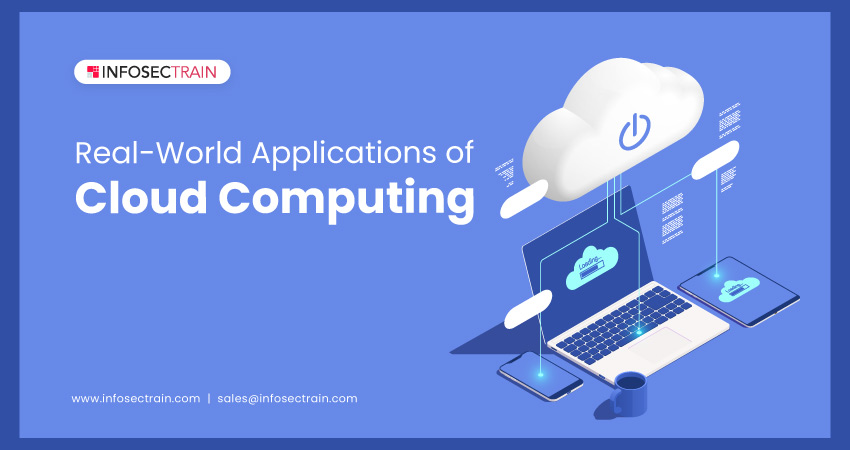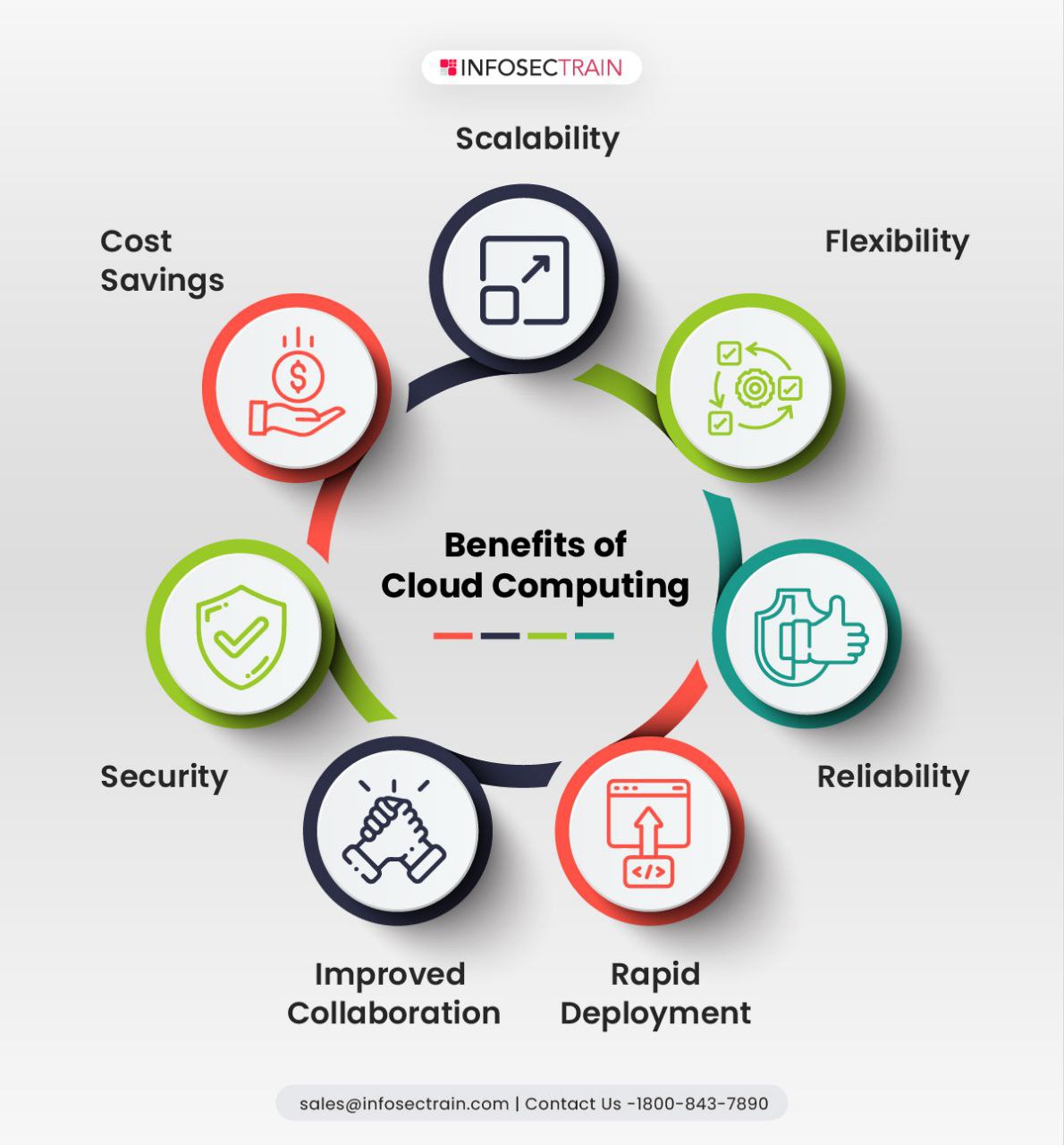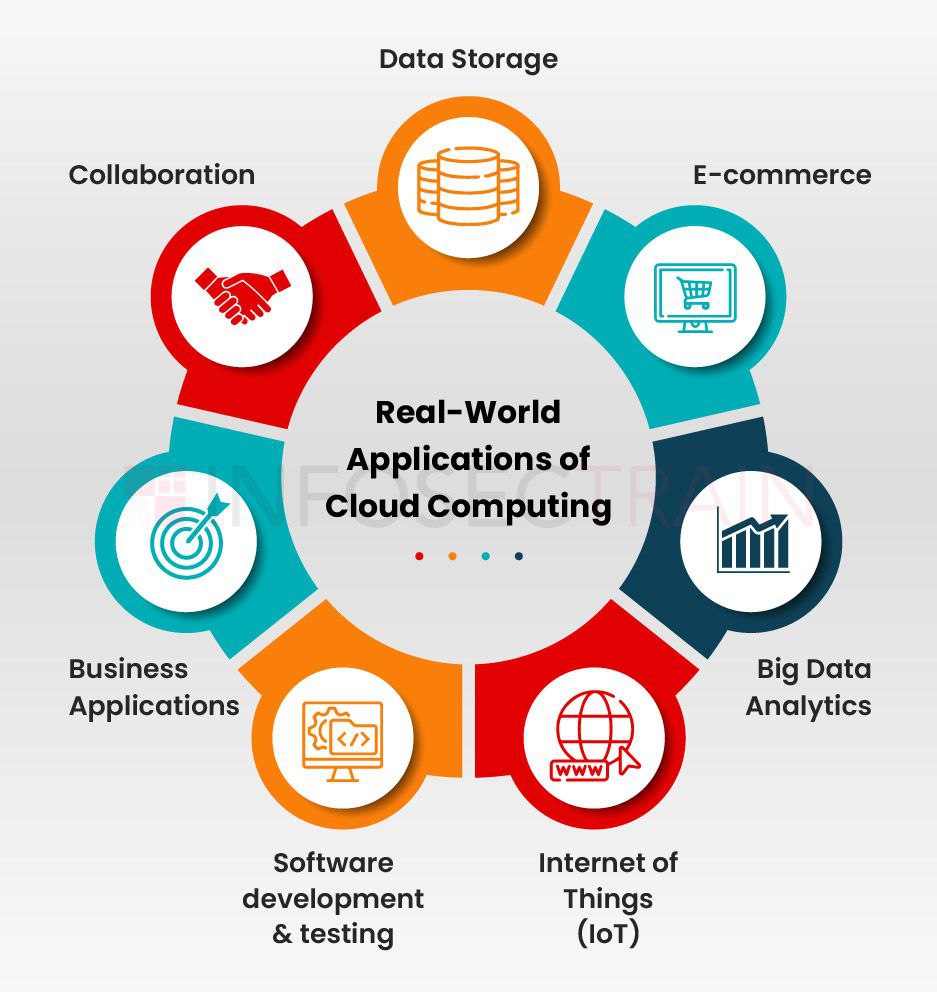Real-World Applications of Cloud Computing
Cloud computing has revolutionized how firms and organizations operate in the digital age. It provides a flexible, scalable, and cost-effective approach to managing computing resources and delivering services over the Internet. It has become an important technology for businesses of all sizes, enabling them to access and utilize vast computing power, storage, and other resources without significant investment in hardware and infrastructure. The cloud has transformed how businesses operate, allowing them to streamline processes, improve collaboration, and enhance productivity. As a result, a wide range of real-world cloud computing applications has emerged, ranging from data storage and processing to application development, testing, and deployment. In this digital environment, it is critical to grasp the fundamental advantages and disadvantages of cloud computing and how it may be used to drive corporate growth and innovation.

Table of Contents
What is cloud computing?
Benefits of cloud computing
Real-world applications of cloud computing
What is cloud computing?
Cloud computing is a technology that provides on-demand access to a shared pool of computing resources, including servers, storage, databases, networking, software, and applications, over the Internet. Cloud service providers typically offer these resources, maintain and manage the underlying infrastructure and offer them to users on a pay-as-you-go or subscription-based model.
Benefits of cloud computing
Cloud computing offers numerous benefits to individuals and businesses, including the following:

- Cost savings: Cloud computing decreases the need for costly hardware and infrastructure, thereby reducing overall IT expenses.
- Scalability: Cloud computing enables individuals and businesses to scale their IT resources up or down as required without purchasing new hardware.
- Flexibility: Cloud computing enables employees to access applications and data from any Internet-connected location, facilitating remote work and boosting productivity.
- Reliability: Cloud providers offer high availability and reliability through redundant systems and data backup, reducing the risk of data loss.
- Security: Cloud providers have dedicated teams of security experts who ensure data security is stored on their platforms, reducing the risk of cyber-attacks.
- Improved collaboration: Cloud computing provides a centralized collaboration and file-sharing platform, allowing teams to work together more effectively and efficiently.
- Rapid deployment: Cloud computing allows businesses to deploy applications and services quickly and easily, reducing time-to-market and enabling faster innovation.
Real-world applications of cloud computing
Cloud technology has many applications across industries, including business, data storage, management, entertainment, social networking, education, and art. There are three primary types of cloud computing service models: Infrastructure-as-a-Service (IaaS), Platform-as-a-Service (PaaS), and Software-as-a-Service (SaaS).
Several cloud platforms are available, each with its own set of features and benefits, such as Public Cloud, Private Cloud, Hybrid Cloud, and Community Cloud.
Cloud computing has numerous applications in a variety of industries.
Some examples of real-world cloud computing applications include:

1. Data storage
Cloud storage provides individuals and businesses with a reliable and cost-effective way to store and access data remotely. Cloud storage providers offer different security, backup, and accessibility options, making it easier for users to manage and protect their data. With cloud storage, users can access their files and data from any device with an Internet connection, eliminating the need for physical storage devices and making it easier to share and collaborate on files with others.
2. Software development and testing
Cloud platforms offer developers an easy way to create, test, and deploy applications without expensive infrastructure. Cloud development platforms provide a secure and scalable environment for software development, allowing developers to build and deploy applications more quickly and efficiently. With cloud computing, developers can access the necessary tools and resources, such as Software Development Kits (SDKs), testing tools, and virtual machines, to create and test their software applications.
3. Business applications
Cloud-based business applications, such as Customer Relationship Management (CRM) and Enterprise Resource Planning (ERP), provide businesses with a scalable and cost-effective way to manage their operations. Cloud-based business applications are accessible from any device with Internet connectivity, making it simpler for employees to collaborate and work remotely. Cloud-based business applications also provide businesses with real-time data insights and analytics, enabling better decision-making and a competitive edge.
4. Collaboration
Cloud-based collaboration tools, such as Google Docs and Microsoft Office 365, allow teams to work together on documents, presentations, and other projects in real time from anywhere with an Internet connection. Cloud-based collaboration tools offer a secure and efficient way to collaborate on projects, allowing team members to make changes and track revisions in real time. Cloud-based collaboration tools also provide businesses with better version control and audit trails, making tracking changes and managing workflows easier.
5. Big data analytics
Big data analytics platforms hosted in the cloud enable businesses to process and analyze information swiftly and efficiently, resulting in improved insights and decision-making. Cloud-based big data analytics platforms provide a scalable and cost-effective method for storing, processing, and analyzing data, making it easier for businesses to manage and extract value from their data. With cloud-based big data analytics, companies can quickly identify patterns, trends, and insights, leading to better business decisions and improved performance.
6. E-commerce
Cloud-based e-commerce platforms provide businesses with a scalable and reliable way to manage online transactions, inventory, and customer data. Cloud-based e-commerce platforms offer companies the flexibility and scalability to handle increased traffic and demand, ensuring customers have a seamless shopping experience. With cloud-based e-commerce, companies can easily manage their online stores, inventory, and payments while providing customers with a secure and efficient way to shop.
7. Internet of Things (IoT)
Cloud platforms can provide a centralized hub for managing IoT devices and data, enabling businesses to develop and deploy IoT solutions more efficiently and cost-effectively. With cloud-based IoT, companies can collect, store, and analyze data from multiple IoT devices in real-time, leading to better insights and decision-making. It also provides businesses with better security and scalability options, making it easier to manage and scale IoT solutions as needed.
Cloud computing has various uses across various industries. It provides businesses and individuals with a reliable, scalable, cost-effective way to manage their operations, store and access data, collaborate on projects, and develop and deploy applications.
Cloud with InfosecTrain
InfosecTrain is a training and consulting company specializing in information security and cybersecurity. We offer training courses on ethical hacking, cybersecurity, cloud security, data security, data privacy, and compliance.
Regarding cloud computing, InfosecTrain offers several training courses covering different aspects of cloud computing, including cloud security. These courses help IT professionals and businesses understand the best cloud security practices. Some of the training courses offered by InfosecTrain in the area of cloud security include:
TRAINING CALENDAR of Upcoming Batches For CCSP
| Start Date | End Date | Start - End Time | Batch Type | Training Mode | Batch Status | |
|---|---|---|---|---|---|---|
| 24-May-2025 | 06-Jul-2025 | 19:00 - 23:00 IST | Weekend | Online | [ Open ] | |
| 21-Jun-2025 | 03-Aug-2025 | 09:00 - 13:00 IST | Weekend | Online | [ Open ] | |
| 26-Jul-2025 | 31-Aug-2025 | 09:00 - 13:00 IST | Weekend | Online | [ Open ] | |
| 30-Aug-2025 | 12-Oct-2025 | 09:00 - 13:00 IST | Weekend | Online | [ Open ] |









 1800-843-7890 (India)
1800-843-7890 (India)